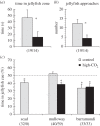Ocean acidification alters fish-jellyfish symbiosis
- PMID: 27358374
- PMCID: PMC4936048
- DOI: 10.1098/rspb.2016.1146
Ocean acidification alters fish-jellyfish symbiosis
Abstract
Symbiotic relationships are common in nature, and are important for individual fitness and sustaining species populations. Global change is rapidly altering environmental conditions, but, with the exception of coral-microalgae interactions, we know little of how this will affect symbiotic relationships. We here test how the effects of ocean acidification, from rising anthropogenic CO2 emissions, may alter symbiotic interactions between juvenile fish and their jellyfish hosts. Fishes treated with elevated seawater CO2 concentrations, as forecast for the end of the century on a business-as-usual greenhouse gas emission scenario, were negatively affected in their behaviour. The total time that fish (yellowtail scad) spent close to their jellyfish host in a choice arena where they could see and smell their host was approximately three times shorter under future compared with ambient CO2 conditions. Likewise, the mean number of attempts to associate with jellyfish was almost three times lower in CO2-treated compared with control fish, while only 63% (high CO2) versus 86% (control) of all individuals tested initiated an association at all. By contrast, none of three fish species tested were attracted solely to jellyfish olfactory cues under present-day CO2 conditions, suggesting that the altered fish-jellyfish association is not driven by negative effects of ocean acidification on olfaction. Because shelter is not widely available in the open water column and larvae of many (and often commercially important) pelagic species associate with jellyfish for protection against predators, modification of the fish-jellyfish symbiosis might lead to higher mortality and alter species population dynamics, and potentially have flow-on effects for their fisheries.
Keywords: behaviour; commensalism; global change; jellyfish blooms; juvenile fish.
© 2016 The Author(s).
Figures


References
-
- Boucher DH. 1985. The Biology of mutualism: ecology and evolution. Oxford, UK: Oxford University Press.
-
- Connor RC. 1995. The benefits of mutualism: a conceptual-framework. Biol. Rev. Camb. Phil. Soc. 70, 427–457. (10.1111/j.1469-185X.1995.tb01196.x) - DOI
-
- Bronstein JL. 1994. Our current understanding of mutualism. Q. Rev. Biol. 69, 31–51. (10.1086/418432) - DOI
MeSH terms
Substances
Associated data
LinkOut - more resources
Full Text Sources
Other Literature Sources

